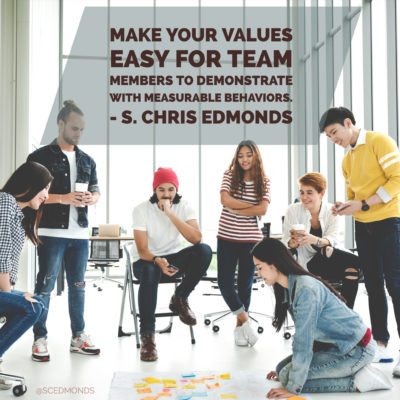Has your company or small business or division or team formally defined how you expect people to treat each other while getting their goals and tasks done every day? If not, you’re leaving the quality of workplace relationships to chance.
Observable, tangible, measurable values are the foundation of a work culture where everyone is treated with trust and respect in every interaction.
Many companies don’t have values statements at all. Those that do rarely have values that are specific and behavioral – much less measurable.
Without clearly defined valued behaviors, leaders and team members are left to “figure it out on their own.” The absence of values clarity and measurability erodes confidence, consistency, and relationships, across the organization.
Living in that environment is exhausting. You must be on guard every minute, waiting for the next dismissive, demeaning, or discounting words or gestures.
In today’s three-minute episode of my Culture Leadership Charge video series, I describe four proven criteria for making your company values measurable – and easy for leaders and team members to demonstrate daily.
My Culture Leadership Charge series features short (two-to-three-minute) videos that describe proven culture leadership and servant leadership practices that boost engagement, service, and results across your work teams, departments, regions, and even your entire company.
Each episode’s “charge” is a challenge for everyone in your organization – not just leaders – to refine their behaviors and ensure everyone is treated respectfully at all times.
You’ll find my Culture Leadership Charge episodes and more on my YouTube channel. If you like what you see, please subscribe!
Don't miss a single episode of @scedmonds' #Culture #Leadership Charge video series - crisp & actionable! #WorkPlaceInspiration #PurposefulCulture http://drtc.me/ytube Share on XPhoto © Adobe Stock – rawpixel.com. All rights reserved.
Does your company have formalized values? Are those values defined in measurable terms? More importantly, do people model your values consistently? Share your insights on Twitter, Facebook, and LinkedIn.




Hi Chris,
As an organizational ombudsman I often consult with employees and supervisors who are in conflict, often because the values within the unit are ambiguous or non-existent. Your suggestions for establishing values are very straight forward and manageable. I particularly like your suggestion of using “I” statements along with the use of behavior described in the “present” tense. When values within the organization are discussed, I seldom (if ever) hear them expressed in this way. Excellent advice. Thank you.
Thank you, Robynn! Great to hear that this approach – values defined in behavioral terms, as part of an organizational constitution – makes sense to you! Maybe there’s an opportunity to get a department on campus to blaze a trail down this path and define their organizational constitution then align all plans, decisions, and actions to it. My book, The Culture Engine, maps out an approach if you’re interested!
Cheers!
C.